| ||||||
| ||||||
| ||||||
| ||||||
Super Stake Blackjack is StakeLogic’s second live dealer game that uses its innovative Super Stake facility.
First used in Super Stake Roulette, the Super Stake element is a fee taken as a percentage of the main hand bet to activate the use of Multipliers in the game.
At first glance, the game looks like a copy of Lightning Blackjack from Evolution. But looks can be deceiving, as Super Stake Blackjack has some differences that make it unique.
This review will explain how the Super Stake Fee and multipliers work during general gameplay. I’ll also demonstrate the unique features and playing strategies before giving my opinion about whether you should play this multiplier game of Blackjack.
For good measure, I’ll quickly compare the three multiplier blackjacks on the market.
Super Stake Blackjack is a regular game of Blackjack that gives the chance of multiplier payouts on hands containing golden cards.
The game is played on a scalable table, allowing an unlimited number of players to play the one-player hand.
Blackjack’s Basic strategy is enforced on the player’s hand to encourage new players. Playing decisions are made automatically by the playing interface. Some discretion is offered to the player on certain playing conditions, like Splitting and Doubling.
The Super Stake is a 50% fee on top of your bet amount, which funds the multipliers.
As for the multipliers – six cards are chosen at the beginning of each game round, and they become the Golden Cards containing multipliers between 2x and 30x.
All standard Blackjack playing rules apply, but note that you cannot deviate from Basic Strategy for most gameplay.
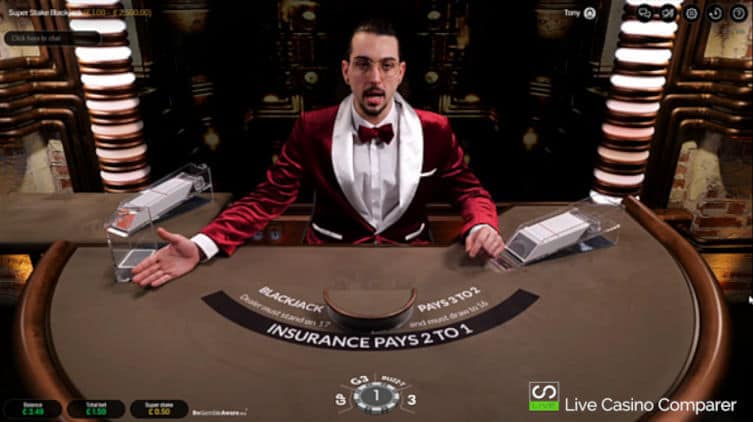
A mandatory Super Stake fee of 50% of your bet is taken at the start of the game round.
Six random cards are selected by the game RNG engine when betting has closed and displayed behind the dealer.
Each card is assigned a multiplier of 2x, 3x, 4x, 5x, 6x, 8x, 10x, 12x, 15x or 30x.
These cards are known within the game as Golden Cards, as they turn Gold if they appear in the player’s hand.
Only the player’s first two cards qualify for the Golden Cards. If a Golden Card is added to the player’s hand after the first two cards, it is ignored as a multiplier card and will not be part of the payout calculation.
The maximum multiplier from the Golden Cards is capped at 60x, so while it’s possible to get more, the maximum will be 60x.
Only the player’s Initial bet is multiplied by the multipliers. Split or Double amounts are not included in the calculation – only the initial bet.
If a player splits a hand, and the hand receives a multiplier and wins, the multiplier will be paid. It will not payout on any losing hands.
The Super Stake fee is not returned as part of any payouts.
Super Stake Blackjack is played to Vegas Rules.

Stakelogic has embedded Blackjack Basic Strategy into this game, which means two things.
The downside is you don’t have the freedom to make your own choices, but in the long term, you should benefit from the strategy being enforced.
The game starts with Betting time, where you place your bet on the table. A further mandatory 50% of your bet amount is taken as a fee for the multipliers.
You can also place a bet on four optional side bets. I’ll give further details below.

Once betting time has closed, the game selects six cards and assigns multipliers before displaying them behind the dealer.
The multipliers range from 2x to 30x.
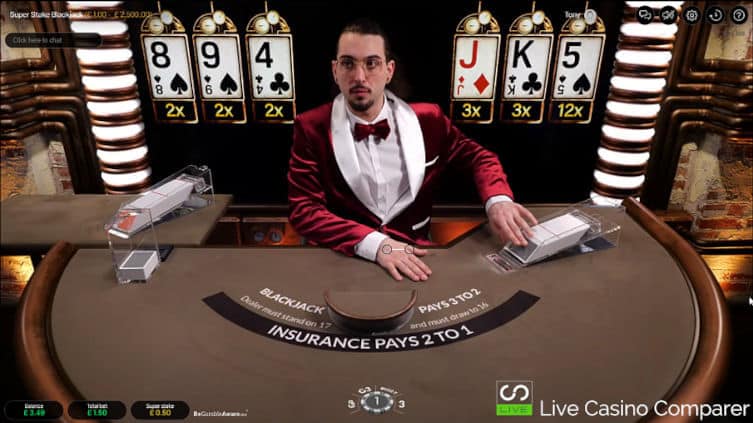
The dealer deals two cards to the player’s position and two to his own.
The dealer will continue to deal cards to the player’s hand according to basic strategy, either Hitting, Standing, Doubling or Splitting the cards.
He plays his hand according to the table rules: to stand on Seventeen or more, Hard and Soft Hands.
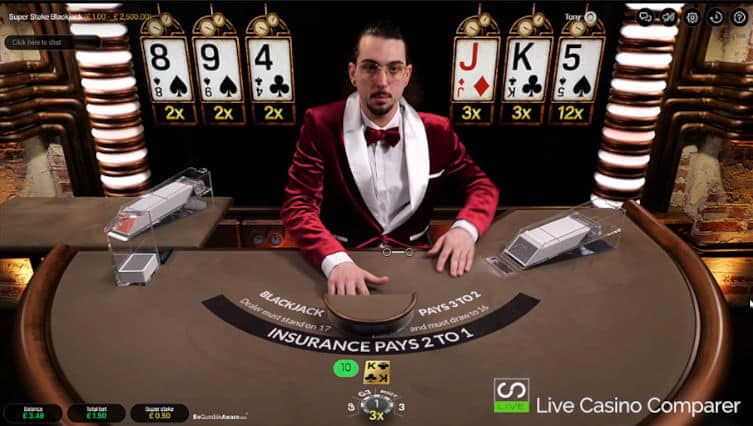
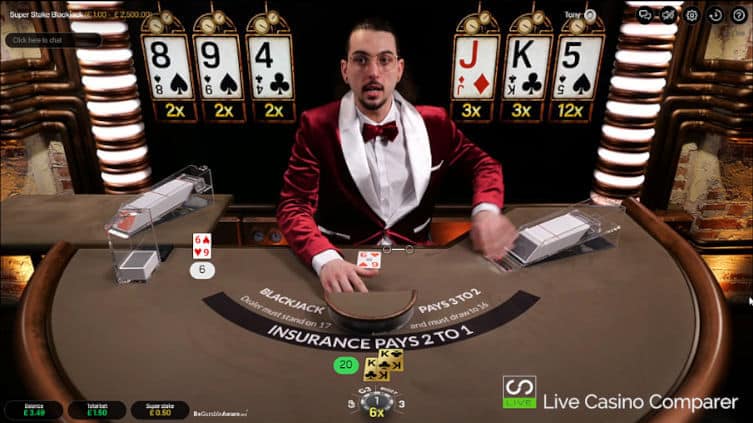
If the player’s hand wins, payouts are made according to the standard Blackjack paytable. If the winning hand contains one or more golden cards, the following calculation is made:
The Super Stake fee is not returned to the player when a hand wins.
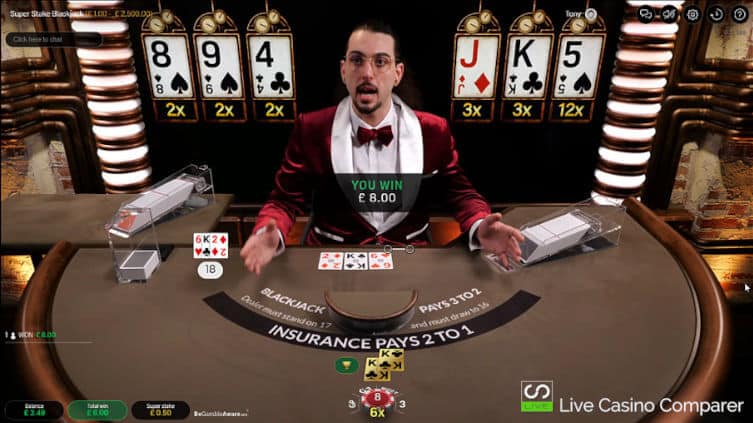
The Golden pairs side bet uses the player’s first two cards. If they form a pair, you win!
The possible payout combinations are:
| Hand | Usual Payout | Explanation |
|---|---|---|
| Golden Pair | 25:1 | Pair in the same suit |
| Coloured Pair | 12:1 | Pair in the same colour |
| Mixed Pair | 6:1 | A mixed coloured Pair Red/Black |
The Golden pairs side bet uses the player’s first two cards and the dealer’s up card.
The possible payout combinations are:
| Hand | Usual Payout | Explanation |
|---|---|---|
| Suited Trips | 270:1 | 3 cards with the same value and same suit |
| Straight Flush | 180:1 | 3 card straight in the same suit |
| Three of a Kind | 90:1 | Three of the same value cards. |
The 3 Side bet is the same as the 21+3 or Poker side bet you see elsewhere. It uses the player’s two cards and the dealer’s up card.
The possible payout combinations are:
| Hand | Usual Payout | Explanation |
|---|---|---|
| Suited three-of-a-kind | 100:1 | Three of the same cards in the same suit. |
| Straight Flush | 40:1 | Consecutive cards in the same suit. |
| Three -of-a-kind | 30:1 | Three of the same card. |
| Straight | 10:1 | A run of consecutive Cards. |
| Flush | 5:1 | Three cards of the same suit. |
The Buzz-T side bet pays when the dealer busts his hand. The more cards he has when he busts, the better the payout!
The possible payout combinations are:
| Buzz-T Hand | Buzz-T Payout |
|---|---|
| Bust with 8 or more cards | 250:1 |
| Bust with 7 Cards | 100:1 |
| Bust with 6 Cards | 50:1 |
| Bust with 5 Cards | 9:1 |
| Bust with 4 Cards | 2:1 |
| Bust with 3 Cards | 1:1 |
Stakelogic has taken the hard work out of the strategy for Super Stake Blackjack.
Blackjack’s Basic Strategy is enforced, so you don’t need to do anything as a player.
However, for interest, Stakelogic has provided a full breakdown of its strategy, which you can access here.
Honestly, the best strategy for the side bets is not to play them. Over the long term, you will lose.
The side bets should be fun, so only play them if you have the bankroll to sustain the many losses you’ll get.
For any other game of Blackjack, I’d advise playing the side bets with caution. But for Super Stake Blackjack, I recommend keeping away from them altogether.
If you’re tempted to play one, play the Buzz-T for a dealer bust, as this side bet stays in play even if you have lost your hand.
The return to player for Super Stake Blackjack is a very disappointing 98.01% if played to optimal strategy.
Regular Blackjack games reach 99% at least, so the multipliers and fees hurt the overall return a player can expect.
Here is an at-a-glance comparison between the three multiplier blackjack in the market. They are from Evolution, Playtech and Stakelogic.
The games are all slightly different in how they play. I can’t recommend any particular one. My advice is to play them all and decide which one you enjoy the most.
Spoiler: You’re unlikely to win on any of them!
Super Stake Blackjack is StakeLogic’s version of Blackjack with multipliers.
Super Stake Blackjack is straightforward to play as Stakelog has developed the game to play to perfect Blackjack Strategy. Decision-making has been taken out of the player’s hands, with the dealer performing actions automatically.
The main difference is the addition of a mandatory Super Stake fee, which is an additional 50% of the main bet. The other difference is the six multipliers of Golden Cards selected at the beginning of every game round, which can boost the payouts for winning hands that have them.
Blackjack’s Basic strategy is enforced in this game.
The RTP for Super Stake Blackjack is 98.01%, which is quite low for a game of Blackjack.
The flat answer is you shouldn’t play Super Stake Blackjack. It is not a well-constructed game, with a poor playing experience. Players will quickly find that they will lose their bankroll unless they get regular multiplier wins. Turning a profit will be rare.
You can play Super Stake Blackjack at casinos that have Stakelogic games. Both Unibet and Leo Vegas are good choices.
The multipliers range from 2x to 30x, with a maximum possible multiplier of 60x allowed. The Golden Cards are only active if held in the player’s first two cards and are not used in payout calculations where doubles are used.
| ||||||
| ||||||
| ||||||
| ||||||
Let’s start with the positives. The game presentation is good, and I like how the theme is carried over from Super Stake Roulette. The game is quick to play, and the dealers are proficient in all aspects of the game. I like the new side bets, Buzz-T and Golden 3, although I’d not play them.
The auto decision-making for Basic Strategy will be frustrating for experienced players. Novice players will benefit from it, but it’s not a game that novice players should be playing because it doesn’t play the way Blackjack should.
The basic payout for Blackjack is 1:1, but with the fee, winning hands are effectively only paid 0.5:1. It’s not hard to see that you only need a run of a few losses and a few wins without a multiplier to see your bankroll disappear.
I have a problem with games that need to charge a fee for in-game features. I’ve yet to come across one that works. It’s a lazy way to develop a game, and I think it should not be made if the game can’t fund features itself.
I also don’t like the way the use of the multipliers is restricted to only the player’s first two cards, and increasing your bets with doubles is excluded from the multipliers. I appreciate this probably makes the game’s maths work, but it stinks from a playability and enjoyment angle.
My advice is not the play Super Stake Blackjack. You’ll find out that if you do after about a dozen hands, your bank balance will be depleted, and there is no way back unless you get a decent multiplier win.
Stake Logic has put together a solution for Blackjack with Multipliers, which I applaud. However, the game has lost the essence of being Blackjack because of the restrictions on payouts for Doubles and Splits and when 3rd multiplier cards don’t count. These restrictions are where Blackjack players would expect to make their money in the game. Stakelogic has taken that away, leaving a game that feels like a legalized mugging for me.
The RTP of only 98.01% does leave some room for Stakelogic to be more generous with some of the restrictive game rules.
Of course, this is just my opinion. I could be wrong. Try the game out yourself, and let me know your thoughts.
If you’re interested in multiplier games, here is a selection you can try.